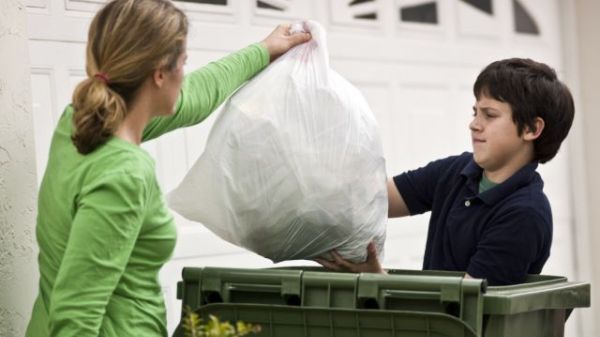Because You Asked: How Can I Teach My Kids the Importance of Recycling?

Dear Recyclebank: I’ve always known that recycling is better for the environment, and filling up landfills is not a good idea, but now I’m faced with convincing my teenage son. He read somewhere that recycling produces more pollution than creating new products, and now he refuses to recycle. How do I convince my hardheaded son the importance of recycling and other environmental efforts? –Rachel K.
Dear Rachel: If, as the incomparable Whitney Houston claims, children really are our future, we understand your desire to make sure they understand the importance of protecting and improving the world they’ll be inheriting. For this reason, it’s important to teach them the value of being environmentally responsible and to involve them in the actions we take to protect our environment. And as we head into a new year, there is no time like the present to get the whole family involved in recycling, energy conservation, and other sustainable habits.
To find out how parents and educators can best educate and involve kids in sustainability, we spoke with James McGirt, Manager of Education Programs for Project Learning Tree, an organization that advances environmental literacy and promotes stewardship via education, professional development, and curriculum resources.
“A good way to start is to make young learners more aware of how their daily actions can improve or hurt the environment,” he says. “It’s of paramount importance to clearly and tangibly illustrate to them that things they do, such as throwing away trash every day, impact the environment, and ways the amount of waste they generate can be reduced.”
McGirt says that one of the best ways to instill environmental awareness is to raise kids who love to be outside. Kids who play outside, ride bikes, garden, swim in lakes and oceans, and camp will grow up to be adults who make environmentally sound choices. Gifting them with a love for the great outdoors also will put a positive spin on sustainability, rather than burdening kids with doomsday facts and future scenarios.
As for those teens that might be less than enthusiastic about participating in sustainability, McGirt says, “I routinely express to teens that I believe that as human beings we have a moral obligation to make the world a better place than how we found it.” He says that many people — including teens — get caught up by the enormity of the environmental challenges and end up losing sight of the fact that it’s all about the little daily steps we can take.
“It’s important to give teens the opportunity to serve as leaders in the quest for environmental awareness and action,” says McGirt.
And more specifically for your “hardheaded” son, Rachel: Since he thinks that adding to landfills is better than using the energy to create products from recyclables, it might help to point him to information about how landfills produce harmful greenhouse gases, and to stand by the fact that recycling goods does save energy, raw materials, and natural resources. He’s not alone in questioning the recycling process, which is why we’ve responded to his exact concern before.
No matter where your kids are in the recycling learning process, there are fun ways to get your kids involved in recycling and reducing waste at home:
Let them pick out a fun reusable water bottle to use instead of buying bottled water. Having a personalized style helps kids (and adults) feel a sense of ownership over their sustainable choice.
Involve them in sorting the recyclables. Little kids can look for the recycling symbol or the plastic number codes on packages.
Start a compost pile in the backyard and let the kids be the ones who turn the compost tumbler or add scraps. It’s a gross-but-cool learning experience to watch how the organic waste decomposes, and to spot the occasional worm helping the process along.
Take a household waste-reduction challenge: Set a goal to see if you can reduce the amount of landfill-bound trash that your family generates each week. Weigh your trash as a baseline, then try to recycle, reuse, or shop smarter each week to throw out less and less trash. If you succeed, have a family celebration — an eco-friendly one, of course, like riding bikes to a favorite ice cream place!
The published article can be seen here:
https://livegreen.recyclebank.com/because-you-asked-how-can-i-teach-my-k...

Comments
I really loved this article! Here in my country recycling doesnt get the importance it deserves, thats why I was looking for options on how I could introduce my future students to do so while teaching them how to communicate in English too.
I loved the will you all have, how you explain everything in such a clear manner that anybody could understand and feel familiar with. Moreover, the methods and ideas on how to involve "hardheaded" kids to recycle is simply amazing! Im quite sure these are very effective. Im going to try them out, thanks!